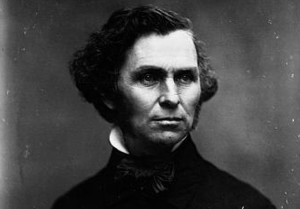One of the most interesting time periods in the American history of alcohol beverage regulation is Prohibition; but the road to Prohibition was not paved overnight. Perhaps the most significant time period is the years prior to the national prohibition on the sale, transportation or manufacture of alcohol beverages within the United States. Of significant note is a law passed by the state of Maine in 1851 called the Maine Law, or “An Act for the Suppression of Drinking Houses and Tippling-Shops.” (See PapersPast.) The Maine Law, fathered by Portland Mayor Neal Dow, was the first state law that prohibited both the sale and the manufacture of intoxicating liquor (with a few exceptions: alcohol used for medicinal or mechanical purposes and foreign liquor that was imported into the U.S.). While prior state laws (e.g., Maine and Oregon) contemplated the ban of the sale of alcohol, the 1851 Maine Law was the first state law to directly forbid the manufacture of alcohol beverages. The Maine Law introduced the idea of total, nationwide prohibition. By 1855, twelve other states had passed a Maine Law or similar, generally using the text of the Maine Law word-for-word. Shortly thereafter, other states passed similar laws that sought to restrict or prohibit the sale and/or manufacture of alcohol (or certain types of alcohol). (Such laws are collectively dubbed “The Maine Laws.”) In some states, however, the laws were declared unconstitutional.
What is curious to note is that, effectively, the Maine Law prohibited the sale or production of domestic wines, but allowed foreign wines to be sold. The reasoning is due to Article 1, Section 8, Clause 3 of the Constitution, which allows for the free movement of goods. Under Article 1, Section 8, Clause 3 (otherwise known as “The Commerce Clause”), Congress has the power to regulate trade with other nations and among several states. In 1851, Congress had established that it was legal to import goods from foreign nations, alas Maine could not regulate the alcohol beverages imported into the U.S. from other nations.
Section 1 of the Maine Law reads:
No person shall be allowed at any time to manufacture or sell, by himself, his clerk, sevant, or agent, directly or indirectly, any spirituous or intoxicating liquors, a part of which is spirituous, or intoxicating, except as hereafter provided.
The text of the Maine Law served as a mold for the 18th Amendment of Prohibition. While the 18th Amendment banned the sale, manufacture, and transportation of an intoxicating liquor within the U.S. (as well as the importation or exportation from the U.S. and its territories), the prohibition of both the sale and manufacture of alcohol beverages stems from the 1851 Maine Laws. The National Prohibition Act also recognized the exemption of alcohol used for mechanical and medicinal purposes, which were carve-out provisions in the original Maine Law of 1851. When thinking about wine and contemporary regulation thereof, it is essential to consider not only the history of regulation in the U.S., but the pathways that lead to regulatory movements like Prohibition. The Maine Laws were one of many factors that lead to Prohibition, and the laws may be one of the strongest influences of what eventually became a national prohibition on the sale, manufacture, and transportation of alcohol beverages.
Photograph property of The Daily.
For more information on wine or alcohol law, direct shipping, or three-tier distribution, please contact Lindsey Zahn.
DISCLAIMER: This blog post is for general information purposes only, is not intended to constitute legal advice, and no attorney-client relationship results. Please consult your own attorney for legal advice.

Lindsey, when time permits you might want to read J.C. Furnas, “The Americans: A social history of the U.S. 1587 – 1914” (Putnam, 1969) for greater insights into the root causes of Prohibition, which repeats much of his earlier book “The Life and Times of the Late Demon Rum.” Although neither book focuses on legal aspects of Prohibiton, but rather the social cuases back to our earliest colonial history. We’ve always been a hard liquor drinking country including right through the years of Prohibition, which in turn almost destroyed the wine industry in America.
Thanks, Les! I will definitely consider reading Furnas at some point soon. I think you raise some strong points, and you are correct that America definitely has its roots in spirits and hard liquor.